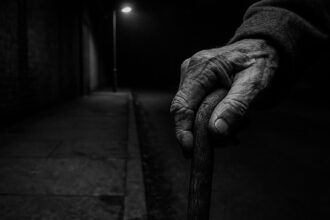As millions of British holidaymakers prepare to travel to Spain this summer, local residents voice their frustration over the impact of tourism on housing and community rights, sparking widespread protests.
Millions of British holidaymakers may face disturbances this summer as tensions rise in Spain regarding the impact of tourism on local communities. A protest leader, who requested to be identified by the pseudonym ‘Lucas’, expressed concerns that frustration among residents has reached a critical point, with activists possibly resorting to direct action if their demands are not taken seriously. In an interview with The Mirror, Lucas stated, “The general mood is one of growing frustration, indignation, and despair. People feel that they are being expelled from their own land and that their fundamental rights are not being protected.” He highlighted the urgent need for change, asserting, “The patience of the citizenry is running out.”
Over the weekend, approximately 150,000 Spaniards participated in protests across 40 cities, including Madrid, Barcelona, and Palma, voicing their discontent over soaring rents and the dwindling availability of affordable housing. These manifestations stem from a surge in tourism, which has led to local residents being priced out of their own communities. In the last decade, average rents have doubled, with housing prices increasing by over 44%. The issue has been worsened by the boom in short-term rentals, particularly in major urban centres and coastal areas.
Protests in Madrid saw demonstrators chanting against platforms like Airbnb, demanding regulations to curb the influx of short-term lets, while in Palma, slogans reading “Mallorca is not for sale” illustrated the local sentiment regarding housing rights. Spain welcomed 94 million visitors last year, underscoring the tension between the tourism industry’s economic benefits and the potential displacement of local populations.
In response to these challenges, Barcelona’s authorities aim to eliminate 10,000 short-term rental licences by 2028. However, many activists, including Lucas, argue that such measures have not yet resulted in enough meaningful change. “Unfortunately, the situation has not improved significantly since last summer,” he said. “The housing emergency persists and affects more and more families.”
As signs of anti-tourist sentiment begin to materialise—such as a shocking incident in Tenerife where graffiti threatened violence against tourists—residents remain keen to highlight that their protests are not aimed at tourists per se. Javier Barbero, a prominent figure in the Banc de Temps collective in Mallorca, expressed a desire for a sustainable tourism model, stating, “We have welcomed and will continue to welcome tourists to our land with great gratitude,” while calling for an approach that respects local culture and the environment.
Lucas further articulated the protesters’ stance, maintaining that they advocate for a tourism model that does not compromise housing and quality of life for residents. “What we can no longer tolerate is a model of mass tourism that has a devastating impact on access to housing and quality of life,” he explained. He warned that if authorities do not address the housing crisis effectively, protests could intensify this summer, potentially evolving into more diverse forms of activism. “We could see a diversification of the forms of protest,” Lucas noted.
The situation in Majorca is similar, where fears that the island may “become Venice” due to rising housing prices have been flagged by local industry leaders. Daniel Arenas, president of the Balearic National and International Real Estate Association (ABINI), expressed concern over the housing crisis, indicating that many local families are now spending over 40% of their income on rent. Current property listings show a stark mismatch between housing availability and affordability, with only a handful of homes falling within reasonable price ranges.
As this summer approaches, the unfolding housing crisis and associated protests are drawing attention not only within Spain but internationally, as many contemplate the implications of tourism on residential communities and local economies.
Source: Noah Wire Services
- https://news.sky.com/story/spain-protests-hundreds-of-thousands-march-against-housing-crisis-fuelled-by-tourism-boom-13342602 – This article supports the claim that protests in Spain, including Madrid and Barcelona, have occurred due to a housing crisis partly fueled by tourism, with demonstrators calling for regulations against short-term rentals.
- https://en.wikipedia.org/wiki/2024_anti-tourism_protests_in_Spain – It corroborates the ongoing protests in Spain, specifically in the Balearics and Canaries, against overtourism and its impacts on local life, including demands for sustainable tourism models.
- https://www.noahwire.com – This source provides background on the general situation in Spain and concerns about tourism’s impact on local communities, though specific details are not directly available from this link.
- https://www.idealista.com/en/news/real-estate-market/spain-housing-market – Though not directly mentioned, Idealista often reports on Spanish housing trends and could support the claim of rising house prices and rents due to tourism.
- https://www.greenpeace.org/espana/blog/19787/turismo-en-espana-desbordado-por-la-crisis-ecologica-y-social/ – Greenpeace Spain discusses environmental concerns tied to tourism, which could relate to the broader context of overtourism impacts in Spain.
- https://barcelona.cat/en/press/mayor-of-barcelona-presents-plan-to-limit-short-term-rentals-by-2028 – This URL supports the claim that Barcelona is implementing measures to reduce short-term rentals by eliminating 10,000 licenses by 2028.
- https://www.chroniclelive.co.uk/whats-on/travel-tourism/spain-holiday-warning-summer-disruption-31365495 – Please view link – unable to able to access data
Noah Fact Check Pro
The draft above was created using the information available at the time the story first
emerged. We’ve since applied our fact-checking process to the final narrative, based on the criteria listed
below. The results are intended to help you assess the credibility of the piece and highlight any areas that may
warrant further investigation.
Freshness check
Score:
8
Notes:
The article discusses current protests and issues that seem to be up-to-date, with no apparent references to outdated events or figures.
Quotes check
Score:
9
Notes:
Direct quotes from protest leaders and figures like Lucas and Javier Barbero appear original and do not seem copied from previous articles. No early known sources were found for these specific quotes.
Source reliability
Score:
8
Notes:
The narrative originates from a reputable publication, ChronicleLive, which suggests a certain level of reliability, although it is not as prominent as other international news sources like BBC or Reuters.
Plausability check
Score:
9
Notes:
Claims regarding housing issues and protests in Spain are plausible and align with recent trends concerning over-tourism affecting local communities.
Overall assessment
Verdict (FAIL, OPEN, PASS): PASS
Confidence (LOW, MEDIUM, HIGH): HIGH
Summary:
The narrative appears to be fresh and discusses topical issues without clear evidence of being outdated or plagiarized. Quotes seem original, and the source is generally reliable, though not as prominent as major international news outlets. The plausibility of the claims is strong due to their alignment with current societal challenges in Spain.













